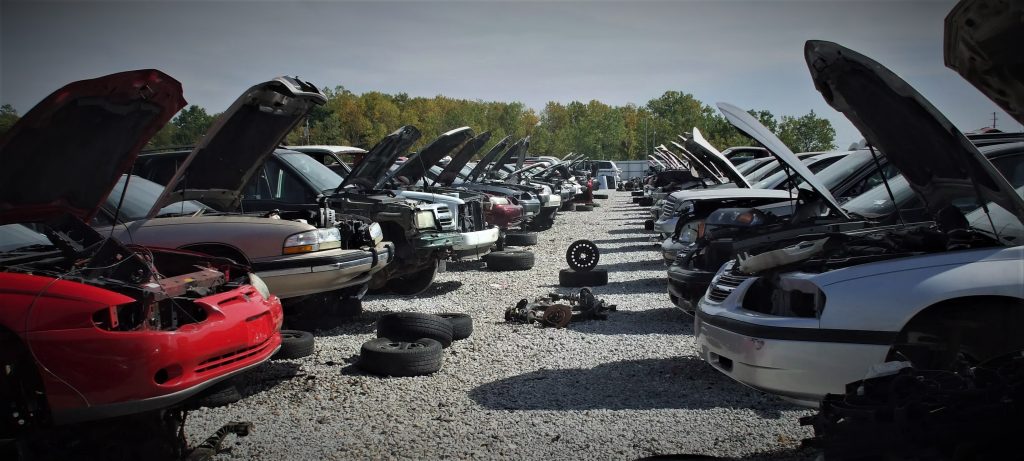It’s often the case that automotive parts can be removed, swapped, resold and reused in other vehicles, but what about parts that can’t function in their current condition and aren’t suitable for remanufacturing?
Many times, the answer is throwing away these worn and damaged parts, but these items don’t just vanish into the ether. Rather, it builds up in ever-expanding landfills, which can have a significant environmental impact.
So why not turn your trash into someone else’s treasure? Many parts and materials that aren’t in good enough condition to enjoy a second life on a vehicle can still be salvaged and made into something new.

Vehicle parts recycling is crucial when it comes to conserving energy and natural resources, and it’s also often more cost-effective than creating all-new materials. If you want to help make a difference and protect the environment for future generations, here are a few things you can recycle to help do your part.
***
Scrap Metal
Let’s get the obvious one out of the way first: scrap metal. Your vehicle is filled with aluminum, iron, and steel, and not all of it can be repurposed and reused without being properly recycled first. Recycling metal is much more energy efficient and cost effective than mining new ore, making it a good way to help save the environment—not to mention pocket some extra cash.
A scrap yard or auto salvage yard is the perfect place to take any metal parts you’re trying to get rid of, and it might even be the perfect place to hunt down some treasure of your own.
***
Batteries
Car batteries contain acids, lead, toxic chemicals and other waste products that can cause serious environmental harm if not disposed of properly. But why dispose of them at all when they can be recycled? Depending on where you live, there are a variety of options available to you.
Some states offer government-run battery recycling programs. In places where such programs don’t exist, many automotive parts stores, service centers, dealerships, and other businesses will accept your used car battery—and perhaps even pay you for it.
***
Tires, Belts & Hoses
Worn out tires, belts and hoses aren’t biodegradable and count among the most problematic types of vehicle waste, with tires especially taking up large amounts of space in landfills. Fortunately, these items can be recycled into new rubber materials.
Common uses for the rubber from these items include rubberized asphalt, garden bed mulch, running tracks, playgrounds, and other artificial surfaces. Tires that can’t be retreaded can even be used to create tire-derived fuel, which is used in certain industries like cement manufacturing.
***
Engine Oil & Oil Filters
Recycling used engine oil and oil filters is another excellent way to help protect the environment. Incorrectly disposing of used motor oil be very harmful to the soil, groundwater, and other parts of the ecosystem. In fact, according to the EPA, one quart of oil poured down a storm drain has the potential to contaminate 1 million gallons of water.
Automotive service businesses will automatically collect and recycle your used oil and filters when you go in for an oil change, but if you’re reading this, there’s a solid chance you often perform such work on your own. Used motor oil can be dropped off at auto parts businesses acting as collection centers, which will then send the oil to be re-refined through a process that removes grime, impurities and heavy metals. Meanwhile, filters can be drained of oil, and their steel components can be scrapped and reprocessed to make other items.
***
Catalytic Converters
There’s a reason why catalytic converters are one of the most commonly stolen car parts: they contain useful and valuable metals like platinum, palladium, and rhodium. Used in a wide range of industries, these materials hold plenty of value on their own, even if your catalytic converter no longer works. Recycled catalytic converters can be used to make electrical parts, jewelry, and industrial components.
Ridding yourself of a worn-out catalytic converter shouldn’t be too difficult. You can try selling them online using Facebook Marketplace, Craigslist, or enthusiast forums, or take them to a local dealer or scrap yard.
***
Car Floor Mats & Carpet
Old car floor mats and carpeting are made of multiple materials that don’t break down easily in landfills. The good news is that, even when it’s not in good enough condition to be reused, these materials can still be recycled in a variety of ways. Old mats and carpeting can be turned into a plastic resin used in a variety of products, including insulation, composite sheets, and even backing for new carpet.
Whether or not you can find a local recycler that takes old carpeting depends a lot on where you live, but if you’re looking for a way to recycle at home gardening offers other solutions. Old carpeting makes for great insulation for compost piles or as a means to help manage weeds.
***
Car Glass
Many of the glass items in your vehicle can be recycled—yes, even windshields. Glass used in windshields features a polymer laminate called a PVB (polyvinyl butyral) interlayer, which makes it more impact resistant and helps to prevent it from shattering in an accident. Modern recycling technologies allow for PVB to be separated from the glass, which can then be crushed, cleaned, and reused for other applications.
The glass from windshields, windows, and other vehicle components can be converted into glass bottles or fiberglass insulation, or it can be blended with concrete to make flooring, countertops, and more. Many localities offer glass recycling programs, but even if yours doesn’t, a quick online search can help you find a business that will recycle your automotive glass.

Comments